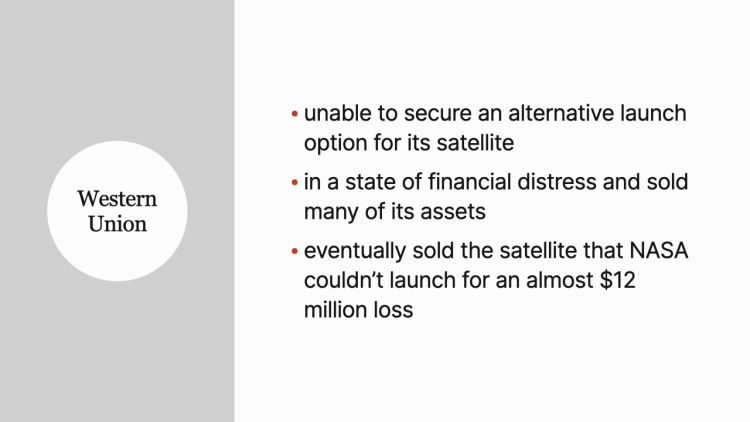New Valley Corp. v. United States
United States Court of Federal Claims
72 Fed. Cl. 411 (2006)

- Written by Eric Cervone, LLM
Facts
New Valley Corp. (plaintiff), formerly known as Western Union, wanted to launch two communications satellites. New Valley contracted with NASA (defendant) to launch the satellites. NASA launched the first satellite. Several months prior to the scheduled launch date for the second satellite, the Space Shuttle Challenger exploded. In response to the explosion, NASA advised New Valley that it had decided to suspend planning for the satellite launch. The government eventually implemented a policy restricting NASA’s launch services to satellites. NASA thus informed New Valley that NASA would not be able to launch New Valley’s satellite prior to the expiration of their contract. New Valley attempted to find alternative launch options, to no avail. During the same period, New Valley faced severe financial difficulty. New Valley began selling off assets, including its communications satellite division. New Valley sold the satellite that was intended to be launched by NASA for a significant loss. New Valley then filed suit, claiming breach of contract. The parties’ contract limited any award for a breach of contract to direct damages. The trial court dismissed New Valley’s claim. The appellate court held that the United States was liable for breach of contract. The case was remanded. New Valley argued that it was ready and able to perform the contract on the day the breach occurred. NASA argued that the relevant date that should be used to determine New Valley’s capacity to perform the contract should be the date of the scheduled launch. NASA argued that, even absent the breach of contract, New Valley’s deteriorating financial condition would have prevented New Valley from being able to launch the satellite. New Valley argued that NASA was still liable for the difference between the value of the satellite with NASA’s contract, and the actual sale price of the satellite. Both parties moved for summary judgment.
Rule of Law
Issue
Holding and Reasoning (Wiese, J.)
What to do next…
Here's why 907,000 law students have relied on our case briefs:
- Written by law professors and practitioners, not other law students. 47,100 briefs, keyed to 996 casebooks. Top-notch customer support.
- The right amount of information, includes the facts, issues, rule of law, holding and reasoning, and any concurrences and dissents.
- Access in your classes, works on your mobile and tablet. Massive library of related video lessons and high quality multiple-choice questions.
- Easy to use, uniform format for every case brief. Written in plain English, not in legalese. Our briefs summarize and simplify; they don’t just repeat the court’s language.





